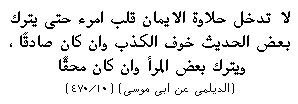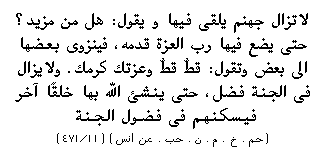Prof. Dr. Mahmud Es'ad COSAN
AKRA FM Friday Discourse
August 18, 2000
-----------------------
VALUE OF GOOD DEEDS
As-selâmu alaikum wa rahmatullàhi wa barakâtuhû!..
Dear Brothers and Sisters,
May your Friday be blessed. May Allah let you live many blessed days and nights. May He give you opportunities to enjoy the blessings of such days and nights. May He honor all of us with His beauty in His Paradise.
a. Do not Despise the Good Deeds
Our beloved Prophet said:

RE. 469/4 (Lâ tahkiranna minal-ma'rûfi shay'an walaw an tasubba min dalwika fî inâ-il-mustaskî, wa an telqà akhàka bibishrin hasen, faidhâ adbara falâ taghtâbuhû) Sadaqa rasûllallàh, fi mâ qàl, aw kamâ qàl.
In this hadith, the Prophet advices us not to despise the value of a favor towards a Muslim even if the favor may seem insignificant: (Lâ tahkiranna minal-ma'rûfi shay'an) "Never despise the value of a good deed." Here, ma'ruf refers to something that complies with the logic, common sense, the tradition and Islamic rules as in al-amru bil-ma'ruf, wa-nahyi anil-munkar i.e., ordaining the good and forbidding the evil.
A believer must do, encourage and support everything that is ma'ruf. Any of the good deeds no matter how insignificant it may appear should not be despised. The Prophet gave an example: (walaw an tasubba min dalwika fî inâ-il-mustaskî) "even if it is pouring some water from your bucket to that of somebody who asks for it." One never knows Allah may reward a person with Paradise just because of that deed.
Our forefathers said, "A nail saves a horseshoe, a horseshoe saves a horse, a horse saves a brave man, a brave man saves a country." A small nail could save a country. That is, small, insignificant deeds will accumulate to produce significant deeds. Little by little one saves a lot of rewards.
The Prophet gave another example: (wa an telqà akhàka bibishrin hasen) "and meeting your friend with a smiling face." The prophet added, (faidhâ adbara falâ taghtâbuhû) "When he leaves, do not gossip or backbite about him." That is, welcoming a friend with a smile and not gossiping about him after he leaves is a good deed.
We ought to do the good deeds even if they may appear to be insignificant. Likewise, we have to avoid bad deeds even if they may appear to be insignificant. This message was conveyed by the Prophet. May Allah Almighty make us comply with what is ma'ruf. Let us be careful about our deeds, manners, behavior, and interaction with people. Let us make them pleasing to Allah.
b. The Pleasure of Iman
The second hadith was narrated by Abû Mûsâ el-Esh'ari RA:

RE. 470/10 (Lâ tadkhulu halâwatul-îmâni qalbemri-in hattâ yetruka ba'dal-hadîthi khawfal-kazibi wa in kâna sàdiqà wa yetruka ba'dal-mirâi wa in kâna muhiqqà)
Let's pay attention to this hadith, too. The Prophet said: (Lâ tadkhulu halâwatul-îmâni qalbemri-in) "The pleasure of Iman does not enter a person's heart (hattâ yetruka ba'dal-hadîthi khawfal-kazibi wa in kâna sàdiqà) until he is afraid of uttering a misstatement even if what he say is the truth." The person is already telling the truth, yet he worries that there may be an overstatement or misstatement in what he says. Such a person withholds what he wants to say.
A person has to be truthful at all times. Yet he has to be very particular about what he says. If he withholds some statements fearing that they not be totally true, he may enjoy the pleasure of iman.
The Prophet continued: (wa yetruka ba'dal-mirâi wa in kâna muhiqqà) " and [until] he quits arguments or quarrels even if he is right."
An argument or a quarrel leads to unpleasant results an harms the friendship. That is why it is recommended that a person stops it even if he is right.
A person who is particular about his statements and who does not insist on arguing can enjoy the pleasure of iman. We ought to practice this hadith. We must be very careful with what we say and we must stop arguments and quarrels even if we are right. This will keep the peace.
c. Hell and Paradise
The third hadith is narrated by Anas RA and included in the collections of Imam Ahmed Ibn-i Hanbal, Imam Bukhari, Muslim, Nasaî, and Ibn-i Hibban--may Allah be pleased with them all. This hadith is about something that will happen in the hereafter:

RE. 471/11 (Lâ tazâlu jahannamu yulqà fîhâ fataqlu: Hal min mazîd? Hattâ yada'a fîhâ rabbul-izzati qadamah, fayanzawî ba'duhâ ilâ ba'd wa taqlu: qattu qattu wa izzatika wa karamik. Wa lâ yazâlu fil-jannati fadlun hattâ yunshi'allàhu bihâ khalqan âkhara fayuskinuhum fî fudlil-jannah) Sadaqa rasûlullah fî mâ qàl aw kamâ qàl.
The prophet said, (Lâ tazâlu jahannamu yulqà fîhâ) "As people are thrown into Hell [for punishment in the hereafter], (fataqlu) it says: (Hal min mazîd?) 'Is there more?'" That is, it is so large that it wants more people.
Imagine a beast with a giant mouth and a giant body. It swallows almost anything at once and asks for more and more. This beast would be nothing compared to Hell. Hell is an enormous world of torture and punishment. Depending on their bad deeds, people will spend time in there. It is a terrible place and impossible to describe with words. Every time a person is thrown in it, it asks for more and more implying that it has plenty of room.
Hell keeps asking for more and more (hattâ yada'a fîhâ rabbul-izzati qadamah) "until Almighty Allah reveals Himself with His Might. Upon that, (fayanzawî ba'duhâ ilâ ba'd) Hell shrinks, folds itself many times, gets smaller (wa taqlu) and says: (qattu qattu wa izzatika wa karamik) 'By Your Grace, I stop asking for more.'"
The Prophet continued: (Wa lâ yazâlu fil-jannati fadlun) "There will be plenty of space left in Paradise after people enters. (Hattâ yunshi'allàhu bihâ khalqan âkhara) Allah will create new beings (fayuskinuhum fî fudlil-jannah) and place them in the remaining space in Paradise."
May Almighty Allah keep us in Paradise. There will be plenty of space in there for everybody. Everybody will be very happy in there. Allah will decorate the remaining space with His new creation.
In another hadith the Prophet informed us that the last person who enters Paradise after spending some time in Hell will have a place in Paradise which will be greater than the earth and seven heavens. This person will think that he got the highest rank in Paradise because nobody will feel sad or deficient in there. There will be endless beauties and bliss to keep everybody content and happy.
May Allah keep us among those who enter Paradise and enjoy the blessings. May He keep us away from those who incur the wrath of Allah. We must work hard to earn the reward of Paradise and avoid all kinds of misdeeds that would take a person to Hell.
May Almighty Allah keep His guidance with you and honor you with His beauty in His Paradise. May He be pleased with you all.
As-selâmu alaikum wa rahmatullahi wa barakatuhû.
August 18, 2000 - AUSTRALIA